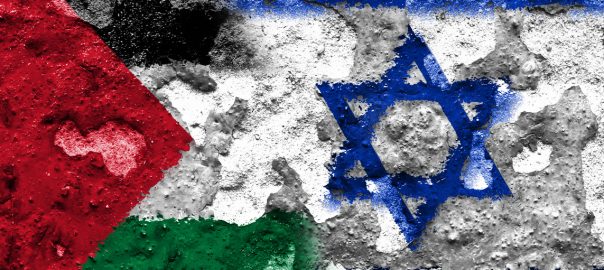
The modern State of Israel was born out of two great movements: 1) the deep desire of Jews throughout history to have a homeland with Jerusalem at the center; and 2) the aftermath of the Holocaust as over six million Jews were systematically murdered during World War II. Form the first reports of the Shoah in 1941 and 1942, to the liberation of the concentration and extermination camps in 1944-1945, the world found it impossible to believe that such dehumanization and mechanized mass murder could happen. General Eisenhower, the Supreme Commander of the Allied Forces, ordered filming and written accounts to be made, and he predicted there would be later denials of this evil.
By 1947 Great Britain could no longer justify restricting Jewish emigration to their ancient homeland and turned over control of its mandate to the newly formed United Nations. During the war, England and all the Allies closed their doors to Jews seeking to escape the Nazi genocide. At Evian in 1938 and again in Bermuda in 1943, antisemitism won the day, even after clear reports of the atrocities.
On November 27, 1947, the United Nations voted Resolution 181) to partition the British Mandate into two areas: a small Jewish enclave where populations were mostly Jewish, and a larger Arab land. The Jewish Zionist groups accepted the small size and difficult borders. The Arab nations and populations did not. The Mufti (Islamic leader) of Jerusalem, Haj Amin El-Husseini, promptly declared jihad and the surrounding Arab nations (Egypt, Syria, Lebanon, Jordan, declared their opposition. The Mufti had been a close ally of Hitler, and he approved of the extermination camps of Auschwitz and Sachsenhausen. On May 14, 1948, Israel declared her independence as a nation, again accepting the UN boundaries. Israel also asked for all peaceful Arabs within her nation to stay in their homes and not take up arms. Alas, the Mufti and the nations around her all called for war.
A truce was declared in 1949. In the next 18 years, a variety of movements, resolutions, and organizations emerged among the Arab opponents of Israel, all saying, “NO!” to Israel’s existence and calling for all her people to be thrown into the sea. Please note, from 1949-1967 Egypt ruled in the Gaza, Syria possessed the Golan Heights, and Jordan ruled Jerusalem and what is called the West Bank. The 400-500,000Arab refugees from the 1948 conflict were NOT welcomed into the Arab nations – they were left on impoverished refugee camps, a perfect place for radicalizing the generations of haters.
The Palestine Liberation Organization and its military branch, Fatah, was established in the 1960s with a charter for the destruction of Israel. It is only at this moment that a “Palestinian national identify” was manufactured by the PLO with KGB support. While many Arabs had lived for generations in this land, they all identified with one of the cultures or nations surrounding them.
Since 1949, there have been numerous opportunities for peace:
- In 1967, Israel defeats her much larger enemies and gains control of the Golan Heights, Gaza, The Sinai, the West Bank (Judea and Samaria), and Jerusalem. These gains came from Israel defeating her foes on the battlefield, not a plan of genocide or expulsion.
- In 1973, Israel was invaded and came close to losing her battle with Egyptian forces in the Yom Kippur War.
- In 1978, Egyptian President Anwar Sadat and Israeli Prime Minister Menachem Begin sign the Camp David Accords, bringing peace between Egypt and Israel, full diplomatic recognition, and a framework for the future. Egypt receives the Sinai Peninsula back and leaves Gaza for a future Palestinian State.
From 1978 to the 2000s, numerous peace plans have been generated, with Israel willing to give back up to 93% of the territories gained in 1967 and even share a Jerusalem capital. Every time these accords are sabotaged by Arab leaders refusing to recognize Israel’s right to exist. The late Yasser Arafat, head of the PLO, would smile for Western cameras, then reassure Arab audiences that Israel’s destruction was still the goal.
In 2005, Israel removed all her Jewish citizens from Gaza and gave control over to the Palestinian Authority, leaving a beautiful land, flourishing businesses, and hope for the future. Alas, in 2006, Gazans, fed up with the corruption of the PA, voted in Hamas, a terrorist organization devoted to Israel’s destruction. Hamas turned Gaza into a fortress, with their military hiding behind civilians.
There is much more to share here, but this historical overview helps the thoughtful person realize that there can be no new Palestinian State and no lasting peace until Arab leaders recognize Israel, commit to diplomacy and trade, and renounce violence.
The apocalyptic ambitions of Shiite-rule Iran, the rapacious economic goals of China, and Russia’s ever-present interest in power all make this region volatile. Add to these empires the scores of Islamic radical movements, and generations of Arabs raised on anti-Jewish propaganda (including Holocaust denial), and we have a potent mix for eternal conflict.
This is the history ignored by current protestors, who chant slogans for Israel’s destruction and Jewish extermination. In the next post, I will assess the current situation and prospects for peace. Israel is far from perfect, but no other nation has held out her hand in peace so often, only to see it slapped away. Israel has no genocidal policies, and she will make peace when her enemies stop their killing.

